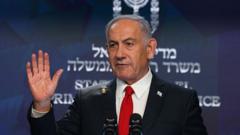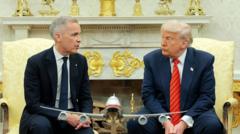The US has condemned Sudan for employing chemical weapons amidst its ongoing civil war with the Rapid Support Forces (RSF), prompting new sanctions that target trade and financial dealings with the country.
US Imposes New Sanctions on Sudan for Chemical Weapons Use in Ongoing Civil War

US Imposes New Sanctions on Sudan for Chemical Weapons Use in Ongoing Civil War
The State Department announces new sanctions against Sudan, citing its use of chemical weapons in conflict with paramilitary forces. The sanctions include export restrictions and financial borrowing limits.
The United States has declared its intention to impose fresh sanctions on Sudan, following discoveries indicating the use of chemical weapons by the Sudanese government during its prolonged civil conflict with the Rapid Support Forces (RSF). The announcement, made by State Department spokesperson Tammy Bruce, specifies that restrictions on US exports to Sudan and limits on financial borrowing will be enforced starting June 6.
The brutal civil war, now entering its third year, has already resulted in the deaths of over 150,000 individuals, triggering a humanitarian crisis that has left 12 million displaced and 25 million reliant on food assistance. Both the Sudanese military and the RSF have faced allegations of war crimes amid their struggle for power.
Although details regarding the specific types of chemical agents used remain unclear, reports from the New York Times earlier this year alleged that Sudan had deployed chlorine gas on at least two occasions, a toxic substance known for its harmful and potentially lethal effects. “The United States calls on the government of Sudan to cease all chemical weapons use and uphold its obligations under the Chemical Weapons Convention,” mentioned the statement from the US. Almost all nations, including Sudan, are signatories to this international treaty aimed at eliminating chemical warfare, with few exceptions including North Korea and South Sudan.
This is not the first instance of the US applying sanctions to Sudan; earlier in the year, the US targeted leaders on both sides of the conflict. Sudan’s military chief, Abdel Fattah al-Burhan, along with RSF leader Mohammed Hamdan Daglo, known as Hemedti, have been accused of destabilizing Sudan and engaging in genocide.
Despite these new sanctions, experts indicate that they may have limited impact due to previous measures already in place. The recent US actions also complicate relations involving the United Arab Emirates, which Sudan accused of supplying arms to the RSF — an allegation the UAE refutes. The diplomatic tensions were heightened after US President Donald Trump's visit to the Gulf nation, leading some congressional Democrats to seek to halt US arms sales to the UAE.
A Sudanese diplomatic source commented that the sanctions appear to be a diversion from the ongoing congressional scrutiny of the UAE's activities related to Sudan. Meanwhile, a recent ruling from a prominent UN court dismissed Sudan’s attempt to initiate a genocide lawsuit against the UAE, reflecting the complexities of international relations in the region.
As the situation evolves, casualties and humanitarian needs continue to mount, leaving millions in dire straits as international stakeholders navigate the treacherous landscape of Sudan’s conflict.



















